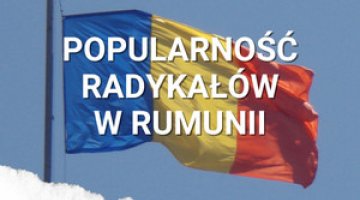Romania: a new president, a new era?
The long-term mayor of Sibiu, Klaus Iohannis, was the unexpected winner of the presidential runoff in Romania on 16 November. For a long time he has been an activist representing the German national minority and became a candidate of the two main Romanian centre-right parties. He won a high level of support, garnering 54,4% of the vote to defeat the front-runner, Prime Minister Victor Ponta representing the Social Democratic Party. What decided on Iohannis’s victory was the high mobilisation of the public (turnout reached 64%) in response to the fact that Victor Ponta’s government organised the election poorly for the Romanian diaspora. Furthermore, being de facto outside the political mainstream, Iohannis gave rise to the hope that his style of ruling would be different, that he will combat corruption and modernise the state. He will be an active player on the political scene, since he will be making efforts to pave the way for centre-right parties to take power. He will also uphold the strongly pro-Atlantic and pro-European approach in foreign policy.
The play for the presidency
The overriding goal of all major groupings on the Romanian political scene over the past year has been victory in the presidential election. The presidency is not only an office of great prestige; it also offers real opportunities to co-govern the country. In the Romanian political system, the president is endowed with strong prerogatives in the areas of foreign policy and security: the president participates in NATO and EU summits, puts forward the security strategy and supervises the secret services. The president also designates the candidate for prime minister, may decide on referenda, nominates part of the Constitutional Court judges and co-decides on the nominations of prosecutor general and the head of the anti-corruption agency DNA. The strength of the presidency has been clearly demonstrated by outgoing president Traian Basescu, who tended to stretch his constitutional prerogatives. . His style could be defined as ‘playmaker presidency’, and he successfully blocked a number of governmental initiatives.
The upcoming presidential election served as a catalyst for serious changes on the Romanian political scene. The Social-Liberal Union (USL), the governing grand coalition in which the Social Democrats (PSD) and the National Liberals (PNL) were the leading parties, split at the beginning of 2014. The gel binding this coalition together was their struggle withPresident Basescu and his tenure, the end of which led to USL’s erosion. The break-up of USL made it possible for Victor Ponta to run for the presidency since, pursuant to the previous coalition agreement, PNL’s candidate was to represent USL in the presidential race. In turn PNL had moved into opposition and so could seek support from centre-right electorate more actively and made attempts to unite the centre-right parties. The Christian Liberal Alliance (ACL) coalition was formed in June this year. This is an electoral alliance of PNL and the Democratic Liberal Party (PDL), the second most important right-wing party, which has been in opposition since mid 2012. The leader of PNL, Klaus Iohannis, who joined this party only at the beginning of this year, became ACL’s candidate for president.
The electoral campaign was dominated by domestic problems: corruption, economic issues and a malfunctioning administration. Iohannis in his campaign above all attempted to capitalise on his image of an unusually successful city mayor and a person who has been outside the political mainstream. He attacked the prime minister’s milieu in connection with corruption scandals and warned about the concentration of power in hands of the social democrats. In turn, Prime Minister Ponta made promises that he would improve the social situation and capitalised on the old divide into supporters and opponents of President Basescu, trying to present Iohannis as the unpopular president’s heir. Foreign affairs were not a subject of serious debate. Both candidates emphasised the pro-Atlantic and the pro-European approach in foreign policy and strong support for Moldova’s European aspirations (Ponta was clearly drawing upon the idea of unification in his campaign).
The phenomenon of Iohannis’s victory
Prime Minister Victor Ponta was the unquestionable frontrunner during the electoral campaign. He had a ten point lead in the first round, and almost all opinion poll centres were indicating that he was set to win the runoff. Furthermore, the prime minister was backed by a section of the mainstream media (in particular, television) and proved in two presidential debates that he was more skilful at using rhetoric than Iohannis. However, the result was seriously affected by the disastrous organisation of the election for the diaspora during both rounds of the vote. Voters had to queue for hours, and the government did not agree to an increase in the number of polling stations abroad during the runoff. This led to massive public dissatisfaction and great mobilisation during the election. Furthermore, Ponta’s strategy involved aggressive attacks on Iohannis who is trusted by the public and who avoided personal arguments; this turned out to be self-defeating for Ponta.
Outlook
Iohannis, capitalising on the wave of public support, will make efforts to remove the Social Democrats from power. It may be expected that he will be a vocal critic of the Ponta government’s activity and will put forward his own initiatives (for example, to partly lift political immunity and to reform electoral law). He is likely to become a patron of all centre-right forces, since this offers them the opportunity to regain public support. The two main centre right parties, PDL and PNL, announced a merger just after Iohannis’s landslide victory and a small right-wing party of Basescu’s loyal supporters may join them later.
Despite the serious blow dealt to Ponta in the presidential election, his cabinet is unlikely to fall. Even if the grouping representing the Hungarian minority leaves the coalition, it will still have over 60% of the votes in parliament. The first decisions made by the Ponta cabinet suggest that they will be making attempts to minimise the prestige losses and slow down the surge in public disillusionment. One manifestation of this was the rapid dismissal of the minister of foreign affairs who was responsible for the organisation of the election abroad (Mihnea Motoc is the new minister of foreign affairs). The prime minister also agreed to withdraw from the controversial amnesty bill (Iohannis insisted on this in his election campaign).
Iohannis clearly lacks experience in foreign policy but it is unlikely he will change its course. It can be concluded from Iohannis’s promises that he will attach great importance to security policy, increasing military spending and enhancing co-operation with the United States. In turn, his good contacts with the German Chancellor Angela Merkel may trigger closer political cooperation with Germany.





